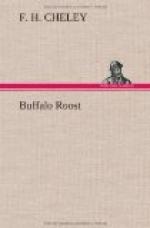“Didn’t you ever stop to consider how many things the Almighty has put into these hills to love, young man, if you ain’t too selfish an’ proud an’ mean to see ’em? I wonder what He thinks of a boy like you, anyway? You’re like a demon sneakin’ through a wonderful picture gallery a cuttin’ holes in the pictures just for fun. I know every jay in this valley, young man, every single one—and they know me. When food gets scarce, an’ cold nights come, an’ snow begins to fall, I feed ’em. They understand all I say to ’em, an’ they bring their young ones for me to see as quick as they’re big enough. They tell me when it’s goin’ to storm, an’ when a hawk is flyin’ over my chicken pen, an’ when berries is ripe, an’ when strangers is comin’. They’re my little family; I care for ’em every day an’—” The flood gates were opened. The little old lady cried as if her heart would break, while the jays gossiped and chattered at the unusual uproar.
Suddenly she turned and went into the house, and the boys, without a word, quietly passed up the trail and into the flat, green meadow ahead. Ham whistled softly to himself as he strode along.
“Beats the Dutch,” he said to Mr. Allen, as the two dropped back together, “how a fellow will forget himself now and then. I’d have done just what she did, only I would have gotten mad instead of just feeling bad. I’m mighty thankful I didn’t kill that bird.”
“What a great joy these simple out-of-doors people get out of nature,” replied Mr. Allen. “I’d give half my college education to be able to see and hear and understand the things that little old lady does in these old hills. Every time a bird chirps or a squirrel barks she knows what it says. I think the Master must have been thinking of some such a pure-hearted body as she when He told the people that the poor in spirit would inherit the earth. She doesn’t go out in society much, nor she hasn’t any party dresses, nor probably never saw a grand opera in her life; but see what she has that most people never get.”
In a few moments more they had crossed the little meadow, climbed up through a zigzag trail through the trees, and came out onto the railroad track, just where it crossed the stage road. Directly in front of them rose the crag-tipped cap of St. Peter’s Dome. On one hand was the old wagon road, that first pathway of mountain civilization, winding down the canyon in long, graceful curves until it was lost in the distant haze, while on the other hand ran the steel rails of more modern civilization.




